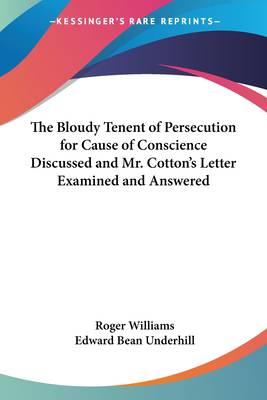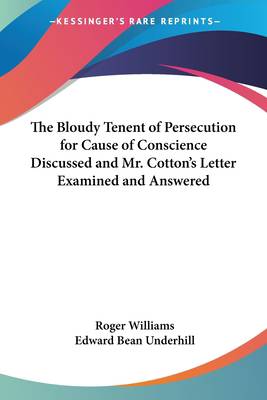
- Afhalen na 1 uur in een winkel met voorraad
- Gratis thuislevering in België vanaf € 30
- Ruim aanbod met 7 miljoen producten
- Afhalen na 1 uur in een winkel met voorraad
- Gratis thuislevering in België vanaf € 30
- Ruim aanbod met 7 miljoen producten
Zoeken
The Bloudy Tenent of Persecution for Cause of Conscience Discussed and Mr. Cotton's Letter Examined and Answered
Roger Williams
Paperback | Engels
€ 55,95
+ 111 punten
Uitvoering
Omschrijving
The Bloudy Tenent of Persecution for Cause of Conscience Discussed and Mr. Cotton's Letter Examined and Answered is a book written by Roger Williams. It is a discussion of the issue of persecution for religious beliefs and the role of government in regulating religion. Williams argues that the government should not have the power to enforce religious beliefs and that individuals should be free to worship as they choose. He also examines a letter written by John Cotton, a prominent Puritan minister, and responds to his arguments in favor of religious persecution. The book was first published in 1644 and is considered a seminal work in the history of religious freedom and the separation of church and state.1848. Rogers was one of the Seekers, a group that adhered to no specific religious practices. It is as a Seeker that he wrote The Bloudy Tenent, while in England attempting to win back the charter for Rhode Island, his enclave of religious toleration amidst the intolerance of the Puritans. Williams' belief, and the main theme of The Bloudy Tenent, was that all individuals and religious bodies were entitled to religious liberty as a natural right, and that civil governments did not have the authority to enforce religious laws. The Bloudy Tenent is structured as a type of dialog between Truth (as seen by Puritans like John Cotton) and Peace (Williams' view) over the issue of Persecution, for Cause of Conscience (namely, the issue of laws favoring one religion over another, and their validity from a scriptural point of view.) It was Williams' thesis that these laws, or any use of secular authority to promote any religious sect, was contrary to the teachings in the Bible. To do so, in Williams' view, was to fall prey to the same error as the tenants in the biblical parable, who killed the son of the landowner in order to lay claim to his property. The Bloudy Tenent is considered to be significant among the works of this period. See other titles by this author available from Kessinger Publishing.This scarce antiquarian book is a facsimile reprint of the old original and may contain some imperfections such as library marks and notations. Because we believe this work is culturally important, we have made it available as part of our commitment for protecting, preserving, and promoting the world's literature in affordable, high quality, modern editions, that are true to their original work.
Specificaties
Betrokkenen
- Auteur(s):
- Uitgeverij:
Inhoud
- Aantal bladzijden:
- 496
- Taal:
- Engels
Eigenschappen
- Productcode (EAN):
- 9781417949458
- Verschijningsdatum:
- 20/09/2004
- Uitvoering:
- Paperback
- Formaat:
- Trade paperback (VS)
- Afmetingen:
- 152 mm x 229 mm
- Gewicht:
- 721 g

Alleen bij Standaard Boekhandel
+ 111 punten op je klantenkaart van Standaard Boekhandel
Beoordelingen
We publiceren alleen reviews die voldoen aan de voorwaarden voor reviews. Bekijk onze voorwaarden voor reviews.











